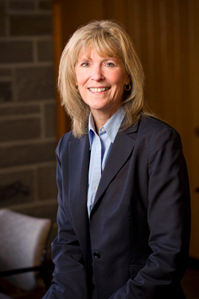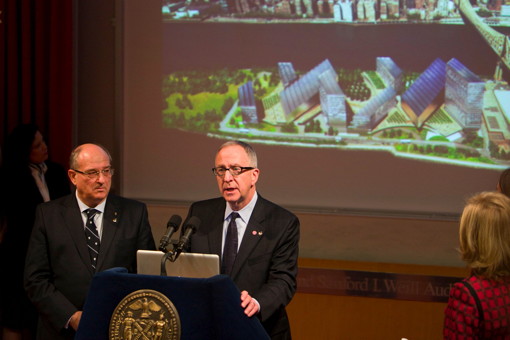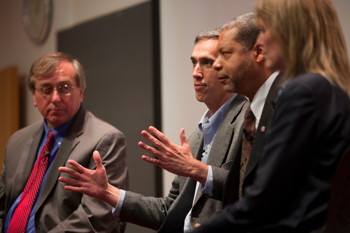COVER STORY
Real work on CornellNYC Tech campus now begins

Dan Huttenlocher, vice provost and founding dean of CornellNYC Tech - Home of the Technion-Cornell Innovation Institute. See larger image
>In December 2011, Cornell learned it had won an intensely fought competition to build an applied sciences and engineering campus in New York City. CornellNYC Tech – Home of the Technion-Cornell Innovation Institute, which pairs Cornell with its partner, Technion-Israel Institute of Technology, will have an economic development and entrepreneurship-oriented curriculum aimed at turning the best ideas of faculty and graduate students into new technologies and commercial applications.
Cornell and Technion's proposal, which combines two of the world's top institutions in science, engineering and technology, looks to increase New York City's capacity for applied sciences and to transform the city's economy.

Cathy Dove, vice president for the CornellNYC Tech campus. See larger image
Dan Huttenlocher, dean of computing and information science, has been named vice provost and founding dean of the CornellNYC Tech campus, and Cathy Dove, associate dean in the College of Engineering, has been named the campus's vice president.
With the city's $100 million pledge in infrastructure upgrades and the land grant of an 11-acre parcel on Roosevelt Island secured, Cornell is on track to break ground in 2015. Instruction will begin in off-site locations in the city starting in September; the first on-campus operations are slated to begin in 2017.
"In New York City, we will build on our already top-notch multidisciplinary academic strengths that make the Ithaca campus a draw for talented students from all over the world," Huttenlocher said. "The tech campus will draw on the strengths of Cornell's graduate programs in Ithaca, with faculty that will span the two campuses."
The news that Cornell and the Technion had won the competition was shared with the world at a New York City press conference in December by Mayor Michael Bloomberg, with thousands of Cornell alumni live-streamed in to help celebrate.
Now, it seems, the real work is just beginning.
On Feb. 16, President David Skorton, Provost Kent Fuchs and Bloomberg announced Huttenlocher's appointment for an initial five-year term. Co-leaders Huttenlocher and Dove will both report to Fuchs.
In addition, Technion computer science professor and deputy senior vice president Craig Gotsman will be director of the Technion-Cornell Innovation Institute (TCII).

Cornell President David Skorton and Technion President Peretz Lavie, left, at the Dec. 19 press conference in New York City.
"Dan Huttenlocher and Cathy Dove employed their extensive knowledge, as well as their well-recognized leadership skills, during every step of the development of our proposal, and they are continuing to drive our effort to bring the new campus to fruition, expeditiously and expertly, for the people of New York," Skorton said. The addition of Gotsman "brings added luster to this impressive team. Cornell and the city are very lucky to have such talented people leading this new – and new type of – campus."
TCII will be a centerpiece of the Roosevelt Island campus. After receiving accreditation from the state of New York, it will confer dual Cornell/Technion Master of Applied Sciences degrees, based on a curriculum with an emphasis on the application of sciences, entrepreneurship and management, as well as other graduate degrees.
Huttenlocher and Dove will oversee the formation of the environmentally sustainable campus, whose operational costs are expected to exceed $2 billion over 30 years; the building of the campus's expert faculty, planned to be about 280 strong in 30 years; its highly selective graduate student population, targeted at about 2,500 by 2043; as well as capital construction of the 2 million-square-foot campus.

An interior rendering of part of the proposed CornellNYC Tech campus on Roosevelt Island. Photo illustration by Cornell. See larger image
"This is an unprecedented opportunity to build a new kind of university campus, focused on technology commercialization rooted in the very best academic research, with educational programs that tie fundamentals to practice, and strong ties to the tech sector of the city's economy," Huttenlocher said. "The planned professional master's degrees will combine business and entrepreneurship with technology, both in the classroom and in engagements with local companies."
"I look forward to working together with Cathy and Craig," Huttenlocher continued. "We are already actively working towards identifying leased space for the start-up phase before we move to Roosevelt Island, gaining approvals for degree programs, involving local tech leaders in our planning, and preparing to hire world-class faculty."

Rendering of part of the proposed tech campus on Roosevelt Island, which includes an amphitheater and a view of Manhattan. Photo illustration by Cornell. See larger image
Cornell leaders of the tech campus initiative detailed immediate next steps during an open forum on the Ithaca campus in February. Fuchs shared a partial to-do list: acquiring academic accreditation, hiring a principal designer and architect for the site, structuring the entrepreneurship-oriented curricula, hiring faculty and recruiting students – all while maintaining Cornell's Ithaca campus and entering into key phases of the "Cornell Now" fundraising campaign.
Students will learn and companies will grow in an environment that breaks with the tradition of departments and schools. The campus will instead be organized around interdisciplinary hubs directed toward sectors of the city's economy, currently planned as Healthier Life, Built Environment and Connective Media. These hubs are designed to change and grow with industry trends.
The year 2012 will bring work on environmental reviews of the Roosevelt Island site and master planning even as inaugural instruction begins in off-site locations in the city this fall.
The plan for the campus includes a 150,000-square-foot, "net-zero" core academic building. If built today, it would be the largest net-zero energy building in the eastern United States and among the top four largest such buildings in the entire United States.

Provost Kent Fuchs; Dan Huttenlocher, founding dean of the CornellNYC Tech campus; Lance Collins, dean of the College of Engineering; and Cathy Dove, vice president of the tech campus, during a February open forum at Cornell. See larger image
The new campus, Fuchs said, is intended to be financially self-sufficient. A $350 million gift from Atlantic Philanthropies, announced in the days leading up to Cornell's winning bid, will help the university immediately start recruiting and hiring new faculty to populate the campus. Atlantic Philanthropies' founding chairman, Chuck Feeney '56, has been among Cornell's most generous benefactors over the years, and his gift – the largest in the university's history – was key to securing Cornell's bid for the campus.
None of the Ithaca campus's operating budget is expected to be diverted to the new campus, Fuchs said.
Fuchs went on to predict that having the tech campus in New York City will create a symbiotic flow of people and ideas that will end up attracting people – and philanthropy – to Cornell in Ithaca, not just New York City.
The Cornell-Technion proposal, Bloomberg said in December, was the boldest and most ambitious of all those submitted. He talked about the dynamic partnership between Cornell and Technion, and he praised Cornell's established presence in New York City with Weill Cornell Medical College, its many academic and extension programs, and its active alumni base.
The campus, he continued, is expected to generate $23 billion in economic activity over the next three decades, as well as $1.4 billion in tax revenue. Building it will create an estimated 20,000 construction jobs and 8,000 permanent jobs to operate it.
Visit http://now.cornell.edu/nyctech